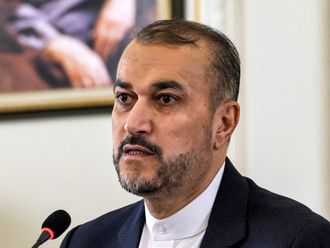Beirut: Twin car bomb blasts in the Syrian-controlled part of the Golan Heights killed eight people on Friday, activists said, as Syria’s government called on its citizens who have fled the country during the civil war to come home - including opponents of the regime.
The persistent violence and the moribund peace plan offered by President Bashar Al Assad, now backed up by the appeal to refugees and his political opponents to return, underlined the intractable nature of the 22-month civil war that has killed more than 60,000 people and left the international community at a loss to find a way to end the bloodshed.
The Britain-based Syrian Observatory for Human Rights said two cars packed with explosives blew up near a military intelligence building in the town of Quneitra on Thursday, killing eight. Most of the dead were members of the Syrian military, the Observatory said. The Syrian government has not commented on the attacks.
There was no claim of responsibility for the blasts. Car bombs and suicide attacks targeting Syrian troops and government institutions have been the hallmark of Islamic militants fighting in Syria alongside rebels trying to topple Al Assad.
Quneitra is on the ceasefire line between Syria and Israel, which controls most of the Golan Heights after capturing the strategic territory from Syria in the 1967 war.
More than half million Syrians have fled to neighboring countries of Lebanon, Jordan and Turkey during the 22-month civil war. They include opposition activists and defectors, including army officers, who have switched to the rebel side, fighting to topple Al Assad, whose family has ruled Syria for more than four decades.
The state-run SANA news agency said the government will help hundreds of thousands of citizens return whether they left “legally or illegally.” Syrian opposition figures abroad who want to take part in reconciliation talks will also be allowed back, SANA reported late Thursday.
If they “have the desire to participate in the national dialogue, they would be allowed to enter Syria,” SANA said, citing an Interior Ministry statement.
The proposed talks are part of Al Assad’s initiative to end the conflict that started as peaceful protests in March 2011 but turned into civil war. Tens of thousands of activists, their family members and opposition supporters remain jailed, according to international activist groups.
The opposition could not immediately be reached to comment the appeal. Its representatives have repeatedly rejected any talks that include Al Assad. The opposition - including the rebels fighting on the ground - insists Assad must step down. Their demand is backed by the international community, but Assad clings to power, vowing to crush the armed opposition.
Both sides remain convinced they can win militarily, and while Al Assad’s forces maintain control over the capital, the rebels have in recent weeks captured large swaths of territory in the country’s north and east, including parts of Aleppo, Syria’s largest city and its main commercial hub.
On Friday, government troops battled rebels on several fronts, including around Damascus.
Regime forces shelled Damascus suburbs in an effort to dislodge rebels who have set up enclaves in the past months in towns and villages around the capital. The troops fired artillery shells at several districts, including on Zabadani and Daraya, according to the Observatory.
Another activist group, the Local Coordination Committees, said regime warplanes carried out airstrikes on the suburb of Douma, the largest patch of rebel-held ground near Damascus.












